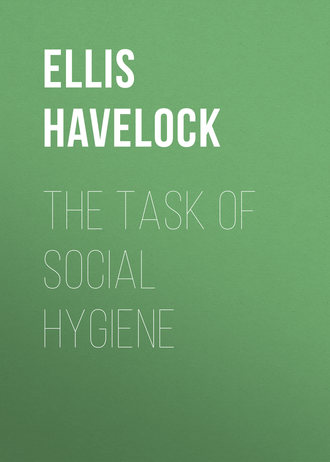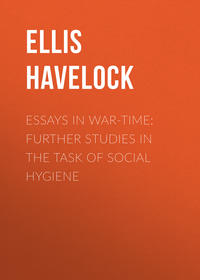 полная версия
полная версияThe Task of Social Hygiene
232
The general strike, which has been especially developed by the syndicalist Labour movement, and is now tending to spread to various countries, is a highly powerful weapon, so powerful that its results are not less serious than those of war. To use it against war seems to be to cast out Beelzebub by Beelzebub. Even in Labour disputes the modern strike threatens to become as serious and, indeed, almost as sanguinary as the civil wars of ancient times. The tendency is, therefore, in progressive countries, as we see in Australia, to supersede strikes by conciliation and arbitration, just as war is tending to be superseded by international tribunals. These two aims are, however, absolutely distinct, and the introduction of law into the disputes between nations can have no direct effect on the disputes between social classes. It is quite possible, however, that it may have an indirect effect, and that when disputes between nations are settled in an orderly manner, social feeling will forbid disputes between classes to be settled in a disorderly manner.
233
The Abbé de Saint-Pierre (1658-1743), a churchman without vocation, was a Norman of noble family, and first published his Mémoires pour rendre la Paix Perpetuelle à l'Europe in 1722. As Siégler-Pascal well shows (Les Projets de l'Abbé dé Saint-Pierre, 1900) he was not a mere visionary Utopian, but an acute and far-seeing thinker, practical in his methods, a close observer, an experimentalist, and one of the first to attempt the employment of statistics. He was secretary to the French plenipotentiaries who negotiated the Treaty of Utrecht, and was thus probably put on the track of his scheme. He proposed that the various European states should name plenipotentiaries to form a permanent tribunal of compulsory arbitration for the settlement of all differences. If any state took up arms against one of the allies, the whole confederation would conjointly enter the field, at their conjoint expense, against the offending state. He was opposed to absolute disarmament, an army being necessary to ensure peace, but it must be a joint army composed of contingents from each Power in the confederation. Saint-Pierre, it will be seen, had clearly grasped the essential facts of the situation as we see them to-day. "The author of The Project of Perpetual Peace" concludes Prof. Pierre Robert in a sympathetic summary of his career (Petit de Julleville, Histoire de la Langue et de la Littérature Française, Vol. VI), "is the precursor of the twentieth century." His statue, we cannot doubt, will be a conspicuous object, beside Sully's, on the future Palace of any international tribunal.
234
Jules de Gaultier, "Comment Naissent les Dogmes," Mercure de France, 1st Sept., 1911. Jules de Gaultier also observes that "conflict is the law and condition of all existence." That may be admitted, but it ceases to be true if we assume, as the same thinker assumes, that "conflict" necessarily involves "war." The establishment of law to regulate the disputes between individuals by no means suppresses conflict, but it suppresses fighting, and it ensures that if any fighting occur the aggressor shall not profit by his aggression. In the same way the existence of a tribunal to regulate the disputes between national communities of individuals can by no means suppress conflict; but unless it suppresses fighting, and unless it ensures that if fighting occurs the aggressor shall not profit by his aggression, it will have effected nothing.
235
A.L. Guérard, "Impressions of Military Life in France," Popular Science Monthly, April, 1911.
236
The history of the efforts to attain a universal language has been written by Couturat and Leau, Histoire de la Langue Universelle, 1903.
237
The distinguished French physician, Dr. Sollier, also, in an address to the Lisbon International Medical Congress, on "La Question de la Langue Auxiliaire Internationale," in 1906, advocating the adoption of one of the existing Romance tongues, said: "Spanish is the simplest of all and the easiest, and if it were chosen for this purpose I should be the first to accept it."
238
It has even been stated by a distinguished English man of science that Latin is sometimes easier for the English to use than is their own language. "I have known Englishmen who could be trusted to write a more intelligible treatise, possibly even to make a more lucid speech, in Latin than in English," says Dr. Miers, the Principal of London University (Lancet, 7th October, 1911), and he adds: "Quite seriously, I think some part of the cause is to be sought in the difficulty of our language, and many educated persons get lost in its intricacies, just as they get lost in its spelling." Without questioning the fact, however, I would venture to question this explanation of it.
239
Thus in one article on the growing extension of the English language throughout the world (Macmillan's Magazine, March, 1892) we read: "English is practically certain to become the language of the world.... The speech of Shakespeare and Milton, of Dryden and Swift, of Byron and Wordsworth, will be, in a sense in which no other language has been, the speech of the whole world." We do not nowadays meet with these wild statements.
240
The stumbling-stones for the foreigner presented by English words in "ough" have often been referred to, and are clearly set forth in the verses in which Mr. C.B. Loomis has sought to represent a French learner's experiences—and the same time to show the criminal impulses which these irregularities arouse in the pupil.
"I'm taught p-l-o-u-g-hShall be pronouncèd 'plow,''Zat's easy when you know,' I say,'Mon Anglais I'll get through.'"My teacher say zat in zat caseO-u-g-h is 'oo,'And zen I laugh and say to him'Zees Anglais make me cough.'"He say, 'Not coo, but in zat wordO-u-g-h is "off,"'Oh, sacre bleu! such varied soundsOf words make me hiccough!"He say, 'Again, mon friend ees wrong!O-u-g-h is "up,"In hiccough,' Zen I cry, 'No more,You make my throat feel rough,'"'Non! non!' he cry, 'you are not right—O-u-g-h is "uff."'I say, 'I try to speak your words,I can't prononz zem though,'"'In time you'll learn, but now you're wrong,O-u-g-h is "owe."''I'll try no more. I sall go mad,I'll drown me in ze lough!'"'But ere you drown yourself,' said he,'O-u-g-h is "ock."'He taught no more! I held him fast,And killed him wiz a rough!"241
It is interesting to remember that at one period in European history, French seemed likely to absorb English, and thus to acquire, in addition to its own motor force, all the motor force which now lies behind English. When the Normans—a vigorous people of Scandinavian origin, speaking a Romance tongue, and therefore well fitted to accomplish a harmonizing task of this kind—occupied both sides of the English Channel, it seemed probable that they would dominate the speech of England as well as of France. "At that time," says Méray (La Vie aux Temps des Cours d'Amour, p. 367), who puts forward this view, "the people of the two coasts of the Channel were closer in customs and in speech than were for a long time the French on the opposite banks of the Loire.... The influential part of the English nation and all the people of its southern regions spoke the Romance of the north of France. In the Crusades the Knights of the two peoples often mixed, and were greeted as Franks wherever their adventurous spirit led them. If Edward III, with the object of envenoming an antagonism which served his own ends, had not broken this link of language, the two peoples would perhaps have been united to-day in the same efforts of progress and of liberty.... Of what a fine instrument of culture and of progress has not that fatal decree of Edward III deprived civilization!"
242
I was at one time (Progressive Review, April, 1897) inclined to think that the adoption of both English and French, as joint auxiliary international languages—the first for writing and the second for speaking—might solve the problem. I have since recognized that such a solution, however advantageous it might be for human culture, would present many difficulties, and is quite impracticable.
243
I may refer to three able papers which have appeared in recent years in the Popular Science Monthly: Anna Monsch Roberts, "The Problem of International Speech" (February, 1908); Ivy Kellerman, "The Necessity for an International Language," (September, 1909); Albert Léon Guérard, "English as an International Language" (October, 1911). All these writers reject as impracticable the adoption of either English or French as the auxiliary international language, and view with more favour the adoption of an artificial language such as Esperanto.
244
A.M. Roberts, op. cit.
245
It should be added, however, that the auxiliary language need not be used as a medium for literary art, and it is a mistake, as Pfaundler points out, to translate poems into such a language.
246
See International Language and Science, 1910, by Couturat, Jespersen, Lorenz, Ostwald, Pfaundler, and Donnan, five professors living in five different countries.
247
The progress of the movement is recorded in its official journal, Progreso, edited by Couturat, and in De Beaufront's journal, La Langue Auxiliaire.
248
In the narrow sense Socialism is identical with the definite economic doctrine of the Collectivistic organization of the productive and distributive work of society. It also possesses, as Bosanquet remarks (in an essay on "Individualism and Socialism," in The Civilization of Christendom), "a deeper meaning as a name for a human tendency that is operative throughout history." Every Collectivist is a Socialist, but not every Socialist would admit that he is a Collectivist. "Moral Socialism," however, though not identical with "Economic Socialism," tends to involve it.
249
The term "Individualism," like the term "Socialism," is used in varying senses, and is not, therefore, satisfactory to everyone. Thus E.F.B. Fell (The Foundations of Liberty, 1908), regarding "Individualism," as a merely negative term, prefers the term "Personalism," to denote a more positive ideal. There is, however, by no means as any necessity to consider "Individualism," a more negative term than "Socialism."
250
The inspiring appeal of Socialism to ardent minds is no doubt ethical. "The ethics of Socialism," says Kirkup, "are closely akin to the ethics of Christianity, if not identical with them." That, perhaps, is why Socialism is so attractive to some minds, so repugnant to others.
251
This idea was elaborated by Eimer in an appendix to his Organic Evolution on the idea of the individual in the animal kingdom.
252
The term "socialism" is said to date from about the year 1835. Leroux claimed that he invented it, in opposition to the term "individualism," but at that period it had become so necessary and so obvious a term that it is difficult to say positively by whom it was first used.
253
An important point which the Individualist may fairly bring forward in this connection is the tendency of Socialism to repress the energy of the best worker among its officials at the expense of the public. Alike in government offices at Whitehall and in municipal offices in the town halls there is a certain proportion of workers who find pleasure in putting forth their best energies at high pressure. But the majority take care that work shall be carried on at low pressure, and that the output shall not exceed a certain understood minimum. They ensure this by making things uncomfortable for the workers who exceed that minimum. The gravity of this evil is scarcely yet realized. It could probably be counteracted by so organizing promotion that the higher posts really went to the officials distinguished by the quantity and the quality of their work. Pensions should also be affected by the same consideration. In any case, the evil is serious, and is becoming more so since the number of public officials is constantly increasing. The Council of the Law Society found some years ago that the cost of civil administration in England had increased between the years 1894 and 1904 from 19 millions to 25 millions, and, excluding the Revenue Departments, it is now said to have gone up to 42 millions. It is an evil that will have to be dealt with sooner or later.
254
Max Stirner wrote his work, Der Einzige und sein Eigenthum (The Ego and His Own, in the English translation of Byington), in 1845. His life has been written by John Henry Mackay (Max Stirner: Sein Leben und Sein Werk), and an interesting study of Max Stirner (whose real name was Schmidt) will be found in James Huneker's Egoists.
255
In the introduction to my earliest book, The New Spirit (1889), I set forth this position, from which I have never departed: "While we are socializing all those things of which all have equal common need, we are more and more tending to leave to the individual the control of those things which in our complex civilization constitute individuality. We socialize what we call our physical life in order that we may attain greater freedom for what we call our spiritual life." No doubt such a point of view was implicit in Ruskin and other previous writers, just as it has subsequently been set forth by Ellen Key and others, while from the economic side it has been well formulated by Mr. J.A. Hobson in his Evolution of Capital: "The very raison d'être of increased social cohesiveness is to economize and enrich the individual life, and to enable the play of individual energy to assume higher forms out of which more individual satisfaction may accrue." "Socialism will be of value," thought Oscar Wilde in his Soul of Man, "simply because it will lead to Individualism." "Socialism denies economic Individualism for any," says Karl Nötzel ("Zur Ethischen Begrundung des Sozialismus," Sozialistische Monatshefte, 1910, Heft 23), "in order to make moral intellectual Individualism possible for all." And as it has been seen that Socialism leads to Individualism, so it has also been seen that Individualism, even on the ethical plane, leads to Socialism. "You must let the individual make his will a reality in the conduct of his life," Bosanquet remarks in an essay already quoted, "in order that it may be possible for him consciously to entertain the social purpose as a constituent of his will. Without these conditions there is no social organism and no moral Socialism.... Each unit of the social organism has to embody his relations with the whole in his own particular work and will; and in order to do this the individual must have a strength and depth in himself proportional to and consisting of the relations which he has to embody." Grant Allen long since clearly set forth the harmony between Individualism and Socialism in an article published in the Contemporary Review in 1879.
256
An instructive illustration is furnished by the question of the relation of the sexes, and elsewhere (Studies in the Psychology of Sex, Vol. VI, "Sex in Relation to Society") I have sought to show that we must distinguish between marriage, which is directly the affair of the individuals primarily concerned, and procreation, which is mainly the concern of society.
257
See, for instance, the opinion of the former Chief Inspector of Elementary Schools in England, Mr. Edmond Holmes, What Is and What Might Be (1911). He points out that true education must be "self-realization," and that the present system of "education" is entirely opposed to self-realization. Sir John Gorst, again, has repeatedly attacked the errors of the English State system of education.
258
The phrase Laissez faire is sometimes used as though it were the watchword of a party which graciously accorded a free hand to the Devil to do his worst. As a matter of fact, it was simply a phrase adopted by the French economists of the eighteenth century to summarize the conclusion of their arguments against the antiquated restrictions which were then stifling the trade and commerce of France (see G. Weuleresse, Le Mouvement Physiocratique en France, 1910, Vol. II, p. 17). Properly understood, it is not a maxim which any party need be ashamed to own.
259
I would again repeat that I do not regard legislation as a channel of true eugenic reform. As Bateson well says (op. cit. p. 15); "It is not the tyrannical and capricious interference of a half-informed majority which can safely mould or purify a population, but rather that simplification of instinct for which we ever hope, which fuller knowledge alone can make possible." Even the subsidising of unexceptionable parents, as the same writer remarks, cannot be viewed with enthusiasm. "If we picture to ourselves the kind of persons who would infallibly be chosen as examples of 'civic worth' the prospect is not very attractive."
260
"Aristotle, herein the organ and exponent of the Greek national mind," remarks Gomperz, "understood by the hygiene of the soul the avoidance of all extremes, the equilibrium of the powers, the harmonious development of aptitudes, none of which is allowed to starve or paralyse the others." Gomperz points out that this individual morality corresponded to the characteristics of the Greek national religion—its inclusiveness and spaciousness, its freedom and serenity, its ennoblement alike of energetic action and passive enjoyment (Gomperz, Greek Thinkers, Eng. Trans., Vol. III, p. 13).
261
Convito, IV, 27.



